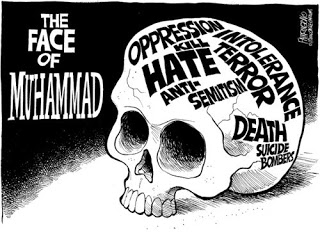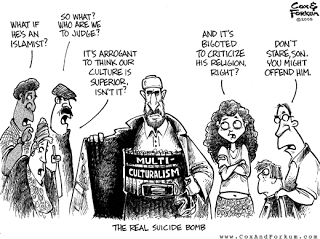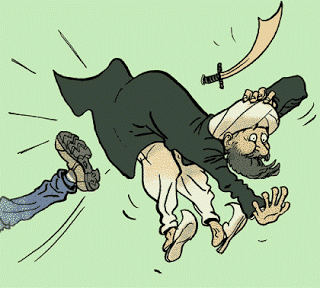An Ethical Basis for War Against Political Islam: Part 1
An excellent analysis by Bill Warner from Political Islam on the ethics, the golden rule and the humanitarian perspective which is in stark contrast to the Islamic ideology and belief which posses none such notions – It is important to know how a political opponent and/or an enemy is thinking as well as his point of view against you, how does he sees you, his motivations, do he respect your right to live and other such questions.
Cultural Relativism is a numbing intellectual bankruptcy embraced by the left meant to prevent people from independent thought, a tool of the Neo-Fascist dogma of Political Correctness with the purpose of suppressing peoples own moral compass which is needed for the left-wing policies in including barbarism preventing individuals in making a value judgment which the left need to pursue their own sinister political agendas and sick ideas of social engineering experiments sacrificing the individual and destroying the ethical principles in the process – Bill Warner - An Ethical Basis for War Against Political Islam: Part 1
Know the Enemy—Sun Tsu, The Art of War
Islam claims that all who do not submit are kafirs (unbelievers). A kafir is hated by Allah and Allah plots against the kafir. Over 60% of the Koran is devoted to the kafir. A kafir may be killed, robbed, raped, enslaved, tortured and mocked. Every mention of the kafir is negative, demeaning, insulting and hurtful. Unbeliever is a neutral word. Kafir is the worst word in the human language.
The second word we need is dhimmi. The original dhimmis were Christians and Jews who got to keep their religion, but lived in a totally Islamic culture. Today a dhimmi is a kafir who apologizes for Islam.
The story of Islam starts with the Jews since Islam is a Jewish heresy. The Koran endlessly adapts Jewish stories such as those of Moses and Noah to show that Mohammed is the prophet of Allah. The Ten Commandments is a good place to start looking at Islam.
Ten Commandments—Religious
Do not have any other gods before Me.
Do not make an image or any likeness of Me
Do not swear falsely by the name of the Lord.
Remember the Sabbath day and keep it holy
Ten Commandments—Ethical
Honor your father and your mother
Do not murder
Do not commit adultery.
Do not steal.
Do not bear false witness against your neighbor
Do not covet your neighbor’s property.
They fall into two categories—religious and ethical. The only religion that follows all the religious commandments is that of the Jews. Christians do not follow the Sabbath commandment and some would argue that the Catholics and Orthodox sects use images and violate the image commandment. Hindus, Buddhists and atheists don’t follow any of the religious commandments. There are no two religions that agree on the Ten Commandments.
Humanity can not agree on religion.
But let’s look at the ethical commandments. Jews, Christians, Hindus, Buddhists, and most atheists agree that lying, theft, murder, sanctity of family, and lusting after other people’s property is bad behavior.
Upon reflection, all of these prohibitions prevent harm to others. We don’t harm others and we don’t want to be harmed. We all want to be treated well and this is the best way to treat others, hence the Golden Rule:
Do unto others, as you would have them do unto you.
The Golden Rule is an ethic of unity. Everyone is treated the same. One ethical system for all people. This has been said in many ways in many cultures. But there is one doctrine that does not agree with these ethics—Islam.
Islamic Ethics
What are Islamic ethics and where do we find them? Everything in Islam is based upon the Koran (what Mohammed said that his god, Allah, said) and the words and deeds of Mohammed (called the Sunna). A Muslim repeats endlessly, “There is no god but Allah, and Mohammed is his prophet.” The Koran repeats again and again that Mohammed is the model or pattern for the ideal Muslim. A Muslim is not someone who worships Allah. A Muslim is someone who worships Allah exactly like Mohammed worshipped Allah. So every Muslim is a Mohammedan. There are absolutely no exceptions.
And where do we find Mohammed’s words and deeds?
1. The Traditions (or Hadith) are collections of everything Mohammed did and said. The best and most honored Hadith is by Al Bukhari.
2. The Sira is the biography of Mohammed and is written by Ibn Ishaq. The Sira is to Mohammed as the books of Matthew, Mark, Luke and John are to Jesus.
There was not enough information in the Koran to create Islam. The Sunna (Hadith and Sira) define almost all of the doctrine of Islam.
The collection of Koran, Sira, and Hadith is called the Islamic Trilogy. The Trilogy contains the complete political doctrine of Islam. Christians have two sacred texts—Old and New Testament. Muslims have three sacred texts. For 1400 years, all three of these texts have only been read by Islamic religious and political leaders, but today these texts are easily understood.
The Trilogy overflows with ethical statements. (These are all from the Bukhari’s Hadith)
Bukhari 9,85,83 Mohammed: “A Muslim is a brother to other Muslims. He should never oppress them nor should he facilitate their oppression.”
Bukhari 8,73,70 Mohammed: “Harming a Muslim is an evil act; killing a Muslim means rejecting Allah.”
Bukhari 5,59,369 Mohammed asked, “Who will kill Ka’b (a Jewish poet), the enemy of Allah and Mohammed?”
Bin Maslama rose and responded, “O Mohammed! Would it please you if I killed him?”
Mohammed answered, “Yes.”
Bin Maslama then said, “Give me permission to deceive him with lies so that my plot will succeed.”
Mohammed replied, “You may speak falsely to him.”
A Muslim should be a brother to other Muslims (not the rest of humanity). A Muslim should not kill another Muslim. A Muslim may lie to kafirs to advance Islam.
So for Islam the ethical statements are:
Do not kill another Muslim
Do not steal from another Muslim
Do not deceive another Muslim
Islam states that a kafir can be killed, robbed, raped and deceived if it will advance Islam. A Muslim does not have to lie, cheat or kill a kafir, it is an ethical option.
Islam divides the entire world into Islam and kafirs and has two sets of ethics, one for Islam and another for the rest. The Golden Rule has the equality of all humanity as its basis. It is not: Do unto some people, as you would have them do unto you, but do unto all people as you would have them do unto you.
Islam denies the universality of the Golden Rule because Islam starts with the division of the entire world, all humanity, into two different groups—Islamic and non-Islamic. Every aspect of Islamic ethics is based upon this separation. Having two distinct groups leads to two different ethical codes. Said another way, Islam has dualistic ethics.
Deceit, violence and force are optional actions against the kafirs. Believers are to be treated as brothers and sisters. Islam’s ethics are based upon:
Good is whatever advances Islam.
Evil is whatever resists Islam.
copyright (c) 2008, CBSX, Inc dba politicalislam.com
You may distribute this as you wish, please do not edit and give us credit.
- Statistical Islam
An Anonnymous commenter left this important comment: Bill Warner, at the Center for the Study of Political Islam, has written a pamphlet called "Statistical Islam" (see page 4 of pdf) which reveals 60% of Islamic doctrine (trilogy Hadith, Sira, koran)...
- Separating Kafirs From Muslims
The following was written by Bill Warner, Director of the Center for the Study of Political Islam: When the al Shabaab jihadi group from Somalia attacked the mall in Kenya, they gathered the crowd together and asked who were Muslims and...
- Jihadists Must See Themselves As Victims
I found the following on Political Islam, the organization who published A Simple Koran. I love this quote: "In short, the poor Muslims were the victims, and the dead kafirs were the oppressors. It has been ever thus for 1400 years." Seeing themselves...
- It's In The Koran: Nine Fun Things To Do With The Infidels
The truth about Islam is that it is, indeed, a violent religion. It allows for no Freedom of Conscience. If a Muslim converts to Christianity, he must be put to death. If a person is homosexual, they must be put to death. If a person has sex outside...
- Duality And Political Islam
An excellent essay from the New English Review by Bill Warner: Since September 11 we have asked the question: "What is the real Islam?" The answers from Muslims and Westerners are contradictory and make us confused. There is one way to gain clarity...
